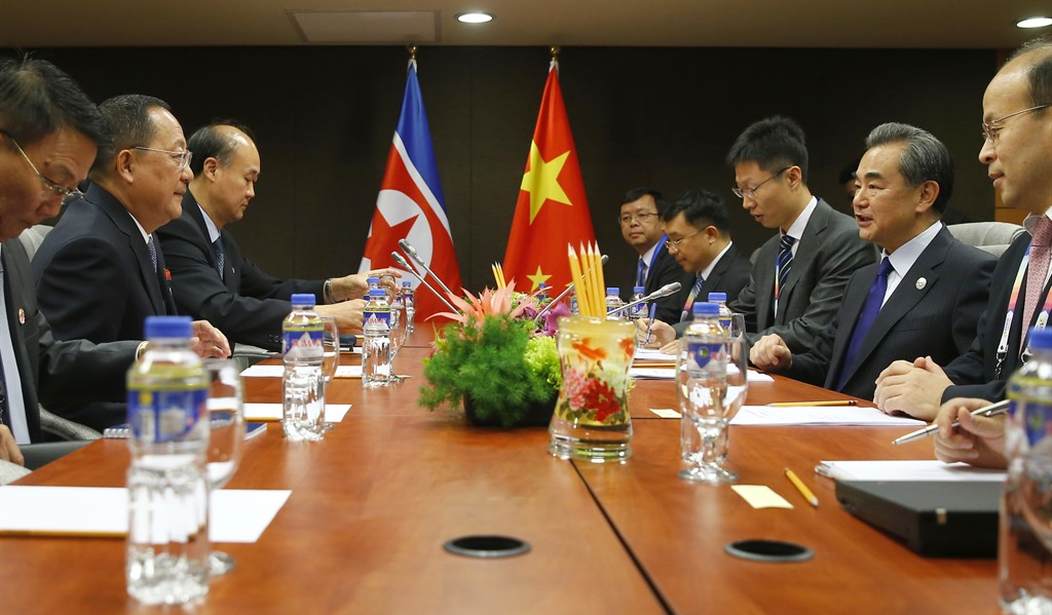The Trump administration scored a big win at the UN this weekend — and no one knows that better than Kim Jong-un. The US won unanimous approval for a new round of sanctions against North Korea for its ICBM testing, this time clamping down on all exports. In return, the Kim regime announced that it would seek “thousands-fold” vengeance on the US — but the few allies remaining to Pyongyang are telling them to back down:
N. Korea threatens to retaliate “thousands-fold” against U.S. for sponsoring new set of tougher economic sanctions https://t.co/ned09S5sG2 pic.twitter.com/sWIA4Pe7lJ
— CBS News (@CBSNews) August 7, 2017
North Korea vowed Monday to bolster its nuclear arsenal and launch “thousands-fold” revenge against the United States to respond to tough U.N. sanctions imposed after its intercontinental ballistic launches. …
In a statement carried by state media, the North Korean government said Monday that the sanctions were a “violent infringement of its sovereignty” that was caused by a “heinous U.S. plot to isolate and stifle” the country.
It said the U.N. sanctions would never force the country to negotiate over its nuclear program or to give up its push to strengthen its nuclear capability. The North said it would take “action of justice,” but didn’t elaborate.
Bloomberg’s Haslinda Amin reports that China thought that the UN action might bring Pyongyang to the table. Not so far, Amin reports, but the Australians seem to think that the Kim regime might have a change of heart after seeing China and Russia both agree to the new sanctions:
China delivered its message in person yesterday, and as Reuters and the Financial Times both note, it was not a message of solidarity:
At a meeting on Sunday in the Philippine capital Manila, China’s Wang Yi told Ri Yong-ho of North Korea that the measures were “necessary, but not the end-goal”, and that the aim was to bring the nuclear aspirant back to the table for talks.
He emphasised that the situation was “approaching a crisis point, and at the same time had become a turning point for returning to negotiations”, according to an account from China’s foreign affairs ministry.
Assuming nations comply with the sanctions, it’s at least a turning point for the Kim regime. The sanctions block all coal imports, as well as iron, lead, and seafood, which will cost Pyongyang over a billion dollars a year in desperately needed hard currency. The question will be whether China, North Korea’s main trading partner, will stick with the sanctions. China has in the past applied sanctions for short periods of time, but then either upped its imports in non-sanctioned items to compensate or evaded the sanctions altogether. Until the last few weeks, China’s trade with North Korea had sharply increased despite sanctions on coal.
Another question will be what kind of response the US will require to get sanctions eased. Rex Tillerson told the ASEAN conference in Manila that an end to all missile tests would be a good start:
“The best signal that North Korea could give us that they’re prepared to talk would be to stop these missile launches,” Tillerson told reporters in the Philippine capital of Manila. “We’ve not had an extended period of time where they have not taken some type of provocative action by launching ballistic missiles.” …
The sanctions could take time before the regime of Kim Jong Un feels any impact, but Tillerson said: “I think perhaps the more important element of that is just the message that this sends to North Korea of how unacceptable the entire international community finds what they’re doing to be.”
Tillerson would not give a timeline on North Korea’s actions that could satisfy the United States, but said “we’ll know when we see it.”
North Korea responded by telling the US not to make the mistake of “believing that its land is safe across the ocean,” which misses the point. The reason the UN went all-in on these sanctions is because the US no longer feels safe across the ocean — and the rest of the world doesn’t want Donald Trump to take pre-emptive action to stop the threat. H.R. McMaster warned on Saturday morning that Trump and his team were considering that as an option, which China and Russia will do almost anything to stop. The less safe Kim Jong-un makes us feel, the less safe China and Russia feel, and the less safe Kim actually is.
Will the Kim regime have a change of heart, as the Australians guess? In rational terms, it should. The problem is that the Kim regime only occasionally acts in a rational manner, and as the WMD-fueled assassination of Jong-nam in the main airport of their (former) ally demonstrates, it’s not even occasionally these days.








Join the conversation as a VIP Member